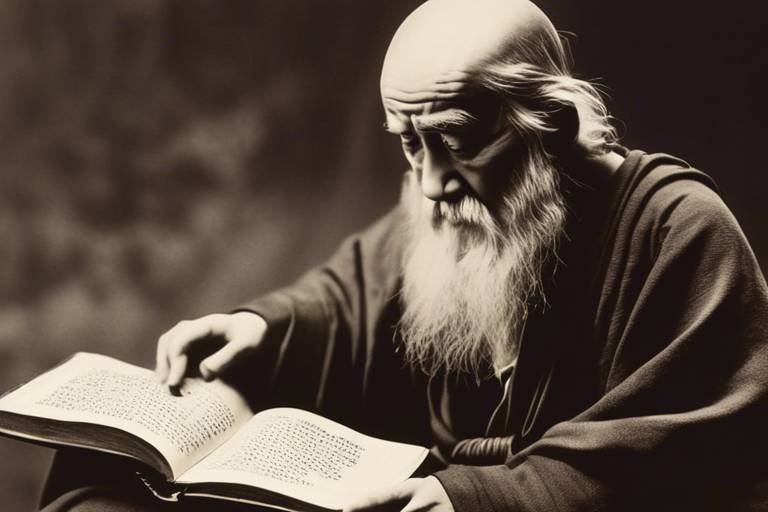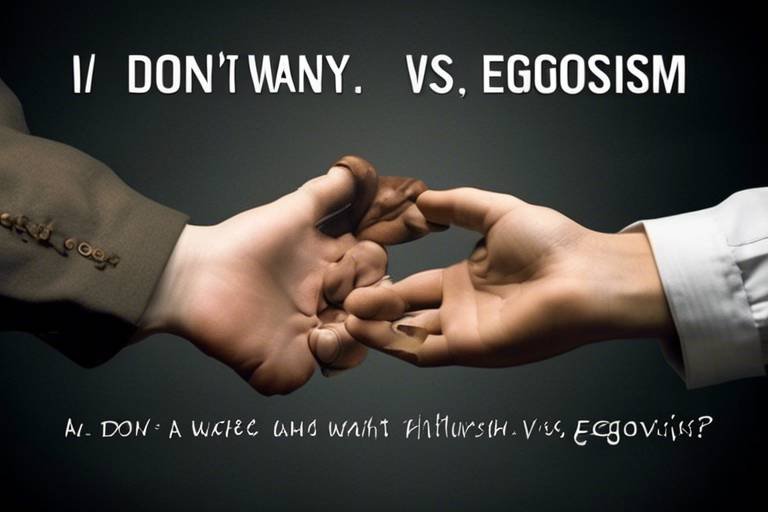Analyzing Phenomenology in Eastern Philosophy
In the vast landscape of philosophical inquiry, the exploration of phenomenology within the context of Eastern philosophy unveils a rich tapestry of insights into human experience and consciousness. This article delves into how these two seemingly disparate traditions intersect, revealing profound implications for how we understand our existence. Imagine standing at the crossroads of two ancient paths, each offering unique perspectives on the nature of reality, perception, and the self. As we embark on this journey, we will uncover the threads that bind phenomenological thought to Eastern philosophies, particularly Buddhism and Taoism.
Phenomenology, at its core, is a philosophical approach that emphasizes the structures of experience and consciousness. It invites us to examine our lived experiences, peeling back the layers to reveal the essence of what it means to be human. This method diverges from traditional Western philosophical approaches that often prioritize abstract reasoning over subjective experience. Instead, phenomenology encourages a return to the first-person perspective, urging us to consider how we perceive and interpret the world around us.
On the other hand, Eastern philosophical traditions, such as Buddhism, Taoism, and Confucianism, offer diverse yet complementary views on existence and consciousness. For instance, Buddhism emphasizes the transient nature of reality through its teachings on impermanence, while Taoism highlights the interconnectedness of all things, suggesting that our experiences are deeply intertwined with the universe itself. These philosophies challenge fixed notions of self and reality, echoing the phenomenological call to explore the fluidity of experience.
As we navigate through this exploration, we will highlight key thinkers and concepts from both phenomenology and Eastern philosophy, illuminating how they converge and diverge in their understanding of consciousness. By examining the interplay between mindfulness in Buddhism and the phenomenological method, we can gain deeper insights into the nature of awareness and subjective experience. Similarly, we will analyze how Taoist ideas about the flow of existence resonate with phenomenological discussions about reality.
Ultimately, this analysis aims to foster a broader understanding of human experience through a comparative lens, revealing how different cultural perspectives can enrich our grasp of consciousness. By engaging with these philosophical traditions, we not only expand our intellectual horizons but also cultivate a more nuanced appreciation for the diverse ways in which humanity seeks to understand itself and its place in the cosmos.
- What is phenomenology?
Phenomenology is a philosophical approach that focuses on the structures of experience and consciousness, emphasizing the importance of first-person perspectives. - How does Buddhism relate to phenomenology?
Buddhism's emphasis on mindfulness and the nature of suffering aligns closely with phenomenological analysis, particularly in understanding subjective experience. - What are the main differences between Eastern and Western philosophies?
Eastern philosophies often prioritize interconnectedness and the fluidity of existence, while Western philosophies traditionally emphasize abstract reasoning and fixed notions of self. - Can phenomenology enhance our understanding of Eastern philosophies?
Yes, phenomenology can provide valuable insights into Eastern philosophies by highlighting the subjective aspects of experience and consciousness.

Understanding Phenomenology
Phenomenology is not just a fancy term thrown around in philosophical circles; it’s a profound approach that dives deep into the very fabric of human experience and consciousness. Originating in the early 20th century, phenomenology was primarily shaped by the work of Edmund Husserl, who sought to explore how we experience the world around us. At its core, phenomenology is about understanding the structures of experience from a first-person perspective. Unlike other philosophical methodologies that might focus on abstract theories or objective truths, phenomenology asks us to look inward and examine our perceptions and experiences as they are lived.
One of the key principles of phenomenology is the concept of intentionality. This means that consciousness is always directed towards something; it is not just a passive state but an active engagement with the world. Think of it like a spotlight illuminating objects in a dark room. The light doesn’t change the objects themselves, but it allows us to see them clearly, highlighting their essence and significance. This focus on subjective experience sets phenomenology apart from other philosophical traditions that may prioritize objective analysis or empirical data.
Another important aspect of phenomenology is the idea of bracketing, or epoché. This involves setting aside preconceived notions and biases to truly engage with our experiences as they present themselves. Imagine stepping into a new city for the first time; if you carry along the baggage of your previous travels, you may miss the unique charm of this new place. By bracketing those past experiences, you can appreciate the city on its own terms, allowing for a more genuine understanding of its essence.
To further understand phenomenology, it’s essential to recognize its evolution and how it has branched into various schools of thought. After Husserl, thinkers like Martin Heidegger and Jean-Paul Sartre expanded phenomenological concepts into existential realms, exploring themes of being, authenticity, and freedom. These developments have led to a rich tapestry of ideas that continue to influence contemporary philosophy, psychology, and even the arts.
In summary, phenomenology is a dynamic and evolving field that invites us to explore the depths of our consciousness and the richness of our experiences. It encourages us to engage with the world in a way that is both reflective and profound, making it a vital area of study for anyone interested in understanding the complexities of human existence. Through this lens, we can appreciate the nuances of our perceptions, leading to a more profound grasp of what it means to be human.

Eastern Philosophical Traditions
Eastern philosophy is a rich tapestry woven from various schools of thought, each contributing unique insights into existence, consciousness, and the nature of reality. At its core, Eastern philosophy seeks to understand the human experience through a lens that diverges significantly from Western paradigms. This exploration encompasses several influential traditions, including Buddhism, Taoism, and Confucianism, each offering distinct perspectives on life and consciousness.
In Buddhism, for instance, the focus is on the nature of suffering and the path to enlightenment. The Four Noble Truths, which outline the reality of suffering and the means to transcend it, serve as a foundation for understanding human experience. This tradition emphasizes introspection and mindfulness, inviting practitioners to delve into their perceptions and the transient nature of existence. Similarly, Taoism presents a holistic view of the universe, emphasizing the interconnectedness of all beings. It encourages individuals to align themselves with the natural flow of life, known as the Tao, which fosters a deep appreciation for the present moment and the cyclical nature of reality.
Confucianism, while often seen as more socially oriented, also contributes significantly to Eastern philosophical discourse. It emphasizes the importance of relationships, moral integrity, and social harmony. Confucian thought encourages individuals to cultivate virtues that enhance personal and communal well-being, thus fostering a sense of interconnectedness that resonates with both Buddhism and Taoism.
To summarize, the major Eastern philosophical traditions can be outlined as follows:
| Tradition | Key Concepts | Focus |
|---|---|---|
| Buddhism | Mindfulness, Suffering, Enlightenment | Inner experience and overcoming suffering |
| Taoism | Interconnectedness, Natural Flow, Harmony | Alignment with nature and the universe |
| Confucianism | Moral Integrity, Relationships, Social Harmony | Ethical living and social responsibility |
These traditions, while distinct, often intersect in their treatment of consciousness and existence. The emphasis on subjective experience in Buddhism, the holistic view in Taoism, and the ethical considerations in Confucianism create a multifaceted understanding of what it means to be human. By examining these traditions, we can gain valuable insights into how different cultures perceive existence and consciousness, ultimately enriching our understanding of the human experience.
In conclusion, Eastern philosophical traditions provide profound insights that challenge conventional Western thought. They invite us to explore the depths of our consciousness, the nature of our relationships, and the interconnectedness of all life. As we delve deeper into these traditions, we uncover a wealth of knowledge that can transform our understanding of ourselves and the world around us.
- What is the main focus of Eastern philosophy? Eastern philosophy primarily focuses on understanding existence, consciousness, and the nature of reality through introspection and ethical living.
- How does Buddhism differ from Taoism? Buddhism emphasizes overcoming suffering and achieving enlightenment, while Taoism focuses on living in harmony with the natural flow of the universe.
- What role does Confucianism play in Eastern philosophy? Confucianism emphasizes moral integrity and social harmony, contributing to the ethical dimensions of Eastern thought.

Buddhism and Phenomenology
Buddhism offers a profound lens through which we can explore the intricacies of consciousness and perception, making it a fascinating subject for phenomenological analysis. At its core, Buddhism emphasizes the importance of mindfulness and present-moment awareness, which aligns seamlessly with phenomenological principles that seek to understand experience as it is lived. This connection invites us to ask: how does our awareness shape our understanding of reality?
One of the fundamental concepts in Buddhism is the notion of suffering (dukkha), which is intricately linked to our perceptions and experiences. Phenomenology, with its focus on the structures of consciousness, provides a framework for examining how suffering manifests in our lived experiences. By engaging with Buddhist teachings, we can uncover the layers of perception that contribute to our sense of self and our interactions with the world around us.
To deepen this exploration, let's consider two key Buddhist concepts that resonate with phenomenological analysis:
- Mindfulness and Awareness: Mindfulness practices in Buddhism encourage individuals to cultivate a heightened awareness of their thoughts, emotions, and sensations in the present moment. This practice not only enhances subjective experience but also aligns with phenomenological methods that prioritize first-person perspectives. By observing our experiences without judgment, we can gain insights into the nature of consciousness itself.
- Impermanence and Experience: The Buddhist principle of impermanence (anicca) challenges our fixed notions of self and reality. This concept invites us to reflect on how our experiences are transient and ever-changing, a theme that resonates with phenomenological discussions about temporality. Understanding impermanence can lead to a deeper appreciation of the fluidity of existence and the interconnectedness of all phenomena.
By examining these concepts through a phenomenological lens, we can appreciate how Buddhism enriches our understanding of consciousness. For instance, mindfulness practices can help us become more aware of the subtleties of our experiences, allowing us to engage with life more fully. Similarly, the recognition of impermanence encourages us to embrace change and uncertainty, fostering a sense of liberation from rigid attachments.
In essence, the intersection of Buddhism and phenomenology opens up a dialogue about the nature of existence and consciousness. It challenges us to consider not just what we experience, but how we experience it. The insights gained from this exploration can lead to transformative shifts in our understanding of ourselves and our place in the world. As we navigate the complexities of our experiences, we may find that both Buddhism and phenomenology offer valuable tools for cultivating awareness and deepening our engagement with life.

Mindfulness and Awareness
When we dive into the rich tapestry of Buddhism, one of the most compelling threads is the practice of mindfulness. But what exactly does mindfulness mean? At its core, mindfulness is about being fully present in the moment, engaging with our thoughts, feelings, and surroundings without judgment. Imagine you're sipping a cup of tea. Instead of rushing through it while scrolling through your phone, mindfulness encourages you to focus on the warmth of the cup, the aroma of the tea, and the intricate flavors dancing on your palate. This simple act becomes a profound experience when approached with awareness.
Mindfulness is not just a practice; it's a way of life. In the context of phenomenology, it offers a unique lens through which we can examine consciousness. By embracing mindfulness, we are not merely observing our experiences; we are actively participating in them. This aligns beautifully with phenomenological methods, which emphasize the importance of subjective experience. Both mindfulness and phenomenology invite us to explore the essence of our experiences, peeling back layers of perception to reveal the deeper truths of our existence.
Moreover, the practice of mindfulness has gained traction in the West, transcending its Buddhist roots and finding a place in psychology, education, and even corporate environments. But the question remains: how does this practice enhance our understanding of consciousness? Through mindfulness, we learn to observe our thoughts and feelings as they arise, creating a space between stimulus and response. This awareness can lead to transformative insights about ourselves and our interactions with the world.
To illustrate the impact of mindfulness on awareness, consider the following aspects:
- Heightened Awareness: Mindfulness sharpens our perception, allowing us to notice the subtleties of our thoughts and feelings.
- Emotional Regulation: By observing our emotions without judgment, we can respond to them more effectively rather than reacting impulsively.
- Connection to the Present: Mindfulness anchors us in the here and now, reducing anxiety about the future or regrets about the past.
In essence, mindfulness serves as a bridge between the self and the world, enhancing our understanding of consciousness through a phenomenological lens. It invites us to explore the richness of our experiences, encouraging a deeper connection to both our inner landscape and the outer world. As we practice mindfulness, we cultivate a profound awareness that reverberates through our lives, shaping how we perceive and engage with reality.

Impermanence and Experience
In Buddhism, the concept of impermanence (Anicca) is not just a philosophical notion; it's a profound realization that shapes how we perceive our experiences and existence. Imagine holding onto a beautiful flower, its vibrant petals captivating your senses. Yet, with time, those petals will wilt and fall away. This transient nature of the flower serves as a metaphor for life itself. Everything we experience is in a constant state of flux, reminding us that nothing is permanent. This understanding challenges our fixed notions of self and reality, compelling us to embrace the moment and recognize the beauty in its fleeting nature.
When we apply the lens of phenomenology to the Buddhist idea of impermanence, we begin to see how our consciousness interacts with the world around us. Phenomenology urges us to examine our immediate experiences without preconceived notions. It invites us to be fully present, much like the practice of mindfulness in Buddhism. By acknowledging that our thoughts, feelings, and perceptions are ever-changing, we can cultivate a deeper awareness of our subjective experiences. This realization can lead to a more profound understanding of our emotions and reactions, allowing us to navigate life's ups and downs with greater ease.
Moreover, the Buddhist perspective on impermanence dovetails with phenomenological themes of temporality and existence. For instance, consider how our memories shape our current experiences. They are not static; rather, they evolve as we change and grow. Our recollections may shift based on our current emotional state or new insights we gain. This fluidity is at the heart of both phenomenological inquiry and Buddhist thought. By recognizing that our experiences are not fixed but are instead a tapestry woven from the threads of past, present, and future, we can begin to understand the interconnectedness of all things.
To illustrate this further, let's consider a table that encapsulates the relationship between impermanence and experience:
| Buddhist Concept | Phenomenological Insight |
|---|---|
| Impermanence | All experiences are transient and ever-changing. |
| Mindfulness | Encourages present-moment awareness, enhancing subjective experience. |
| Non-Self | Challenges the notion of a fixed identity, fostering a dynamic understanding of self. |
| Interconnectedness | Highlights the relationship between experiences and the surrounding world. |
In essence, the Buddhist acknowledgment of impermanence invites us to engage with our experiences more authentically. It teaches us that clinging to fixed ideas can lead to suffering, while embracing change allows for growth and transformation. By integrating these insights into our daily lives, we can cultivate a more profound sense of awareness and appreciation for the present moment. This journey of understanding not only enriches our personal experiences but also enhances our connection to the world around us, reminding us that every moment is both unique and fleeting.
- What is the main idea of impermanence in Buddhism? Impermanence refers to the understanding that all things are in a constant state of change and nothing lasts forever.
- How does phenomenology relate to Buddhist thought? Both emphasize the importance of subjective experience and present-moment awareness, allowing for a deeper understanding of consciousness.
- Can embracing impermanence lead to happiness? Yes! By accepting that change is a natural part of life, we can reduce suffering and cultivate a greater appreciation for each moment.

Taoism's Influence on Phenomenology
Taoism, a philosophical and spiritual tradition rooted in ancient China, offers a fascinating lens through which to explore the intersections of phenomenology and human experience. At its core, Taoism emphasizes the interconnectedness of all things, advocating for a harmonious relationship between humanity and the natural world. This perspective resonates deeply with phenomenological methods, which seek to uncover the essence of experience by examining how individuals perceive and interpret their surroundings. In this light, Taoism not only enriches phenomenological discussions but also challenges them to expand beyond Western philosophical confines.
One of the key tenets of Taoism is the concept of the Tao, often translated as "the Way." This idea encapsulates the natural order of the universe and the fluid, ever-changing dynamics of existence. When we consider phenomenology, which focuses on subjective experience, the Taoist view encourages us to recognize that our perceptions are not isolated events but rather part of a larger, interconnected web of life. This can lead to profound implications for understanding consciousness. For instance, when an individual engages with their environment, they are not merely observing but becoming part of a dynamic interplay of existence. This realization can transform how one approaches their own experiences and the world around them.
Moreover, Taoism introduces the notion of wu wei, or "non-action," which emphasizes effortless action in alignment with the flow of life. This principle can be paralleled with phenomenological concepts that advocate for a suspension of judgment and a return to the immediacy of experience. By practicing wu wei, individuals can cultivate a state of awareness that allows them to engage with their surroundings without the interference of preconceived notions or rigid frameworks. This approach aligns seamlessly with phenomenological methods that encourage individuals to describe their experiences as they are, free from the distortions of societal conditioning or personal bias.
The implications of Taoism for phenomenology extend beyond individual practice; they invite a broader contemplation of existence itself. For example, the Taoist understanding of change and fluidity resonates with phenomenological themes of temporality. In both traditions, the recognition that nothing is permanent and that all experiences are transient can lead to a deeper appreciation of the present moment. This perspective can be particularly liberating, as it encourages individuals to embrace the uncertainties of life rather than cling to fixed identities or rigid narratives.
To illustrate the connection between Taoism and phenomenology, consider the following table that highlights some key parallels between the two philosophies:
| Taoism | Phenomenology |
|---|---|
| Focus on interconnectedness | Emphasis on subjective experience |
| Concept of the Tao as the natural order | Exploration of the essence of consciousness |
| Wu wei (non-action) | Suspension of judgment |
| Acceptance of impermanence | Recognition of temporality |
In conclusion, the influence of Taoism on phenomenology opens up a rich dialogue about the nature of consciousness and existence. By embracing the fluidity and interconnectedness that both traditions advocate, we can gain a more nuanced understanding of our experiences. This synthesis not only enhances our appreciation of Eastern philosophies but also invites us to reconsider the frameworks through which we view the world. Ultimately, the harmony between Taoism and phenomenology encourages a deeper exploration of what it means to be human in a constantly changing universe.
- What is phenomenology? Phenomenology is a philosophical approach that studies structures of experience and consciousness, focusing on how individuals perceive and interpret their experiences.
- How does Taoism differ from Western philosophy? Taoism emphasizes harmony with nature and interconnectedness, while Western philosophy often focuses on individualism and analytical reasoning.
- What role does mindfulness play in these traditions? Mindfulness, particularly in Buddhism, aligns with phenomenological methods by promoting present-moment awareness and a non-judgmental approach to experience.
- Can Taoism and phenomenology be integrated in practice? Yes, integrating the fluidity and interconnectedness of Taoism with the subjective exploration of phenomenology can enhance our understanding of consciousness and existence.

Comparative Analysis
When we dive into the realms of phenomenology and Eastern philosophical traditions, we uncover a fascinating tapestry woven from threads of subjectivity, perception, and the nature of existence. Both schools of thought offer profound insights into human experience, yet they do so from distinct vantage points. While phenomenology, rooted in Western philosophy, emphasizes the structures of consciousness and the first-person perspective, Eastern philosophies like Buddhism and Taoism introduce a more fluid understanding of reality, often challenging the very notions of a fixed self.
One of the most striking similarities lies in the emphasis on experience. Both phenomenology and Eastern philosophies recognize the importance of subjective experience as a foundation for understanding reality. For instance, phenomenologists like Edmund Husserl argue that consciousness is always directed towards something, suggesting that our experiences shape our understanding of the world. Similarly, in Buddhism, the practice of mindfulness encourages individuals to engage deeply with their present experiences, fostering a heightened awareness of thoughts and sensations. This shared focus on experience serves as a bridge between the two traditions, highlighting how our perceptions shape our understanding of existence.
However, as we peel back the layers, we encounter divergent perspectives. Phenomenology often seeks to analyze and categorize experiences, striving for clarity and structure. In contrast, Eastern philosophies tend to embrace the fluidity of experience, often viewing it through a lens of impermanence. For example, in Taoism, the idea of the Tao as an ever-changing flow of existence challenges the notion of static categories. This difference can lead to contrasting interpretations of consciousness; while phenomenology may dissect consciousness into components, Eastern traditions often celebrate its interconnectedness and the transient nature of all things.
To illustrate these points further, let's take a look at the table below, which summarizes the key differences and similarities between phenomenology and Eastern philosophies:
| Aspect | Phenomenology | Eastern Philosophies |
|---|---|---|
| Focus | Structures of consciousness | Interconnectedness and impermanence |
| Methodology | Analytical and descriptive | Experiential and holistic |
| View of Self | Often fixed and defined | Fluid and transient |
| Understanding of Reality | Objective and structured | Subjective and dynamic |
In conclusion, the comparative analysis of phenomenology and Eastern philosophical traditions reveals a rich dialogue between two ways of interpreting human experience. While they share common themes, such as the significance of perception and the subjective nature of reality, their methodologies and underlying assumptions often diverge. This interplay not only enhances our understanding of consciousness but also invites us to explore how these diverse perspectives can inform one another, leading to a more nuanced grasp of what it means to be human in an ever-changing world.
- What is phenomenology? Phenomenology is a philosophical approach that studies the structures of experience and consciousness from a first-person perspective.
- How does Eastern philosophy differ from Western philosophy? Eastern philosophy often emphasizes interconnectedness and impermanence, while Western philosophy tends to focus on analysis and categorization.
- What role does mindfulness play in Buddhism? Mindfulness in Buddhism is a practice that encourages present-moment awareness, enhancing our understanding of subjective experiences.
- Can phenomenology and Eastern philosophy be integrated? Yes, the two can complement each other, providing a richer understanding of consciousness and existence.

Common Themes
When we dive into the rich tapestry of phenomenology and Eastern philosophies, we quickly discover that, despite their cultural differences, they share some profound common themes. At the heart of both traditions lies a deep exploration of subjectivity and perception. This is where the magic happens; both schools invite us to question our understanding of reality and how we experience it. For instance, phenomenology emphasizes the importance of first-person experience, urging us to look at how things appear to us, while Eastern philosophies, particularly Buddhism and Taoism, encourage us to reflect on the nature of our perceptions and the interconnectedness of existence.
One of the most striking commonalities is the emphasis on mindfulness. In phenomenology, being aware of our experiences is crucial for understanding consciousness. Similarly, mindfulness in Buddhism teaches us to remain present and fully engaged with our thoughts and feelings. This practice of awareness not only enhances our understanding of subjective experience but also aligns perfectly with phenomenological methods. It’s almost like they are two sides of the same coin, both beckoning us to pay closer attention to the world around us.
Another theme that emerges is the concept of impermanence. In Buddhism, the idea that nothing lasts forever challenges our fixed notions of self and reality. This resonates with phenomenological discussions about temporality; both traditions recognize that our experiences are fleeting and constantly evolving. The realization that everything is in a state of flux can lead to a deeper understanding of existence, urging us to embrace change instead of resisting it.
Furthermore, both phenomenology and Eastern philosophies highlight the significance of interconnectedness. Whether it’s the Buddhist notion of interdependence or the Taoist idea of the Tao as the underlying principle of the universe, there’s a recognition that our experiences are not isolated. Instead, they are part of a larger web of existence. This interconnectedness invites us to reconsider our place in the world and encourages a sense of empathy and compassion towards others.
To illustrate these themes, let’s consider a simple table that summarizes the commonalities:
| Theme | Phenomenology | Eastern Philosophy |
|---|---|---|
| Subjectivity | Focus on first-person experience | Emphasis on personal perception |
| Mindfulness | Aware of experiences | Present-moment awareness |
| Impermanence | Recognition of fleeting experiences | Understanding of change and transience |
| Interconnectedness | Experiences as part of a larger whole | Emphasis on the web of existence |
In conclusion, the interplay between phenomenology and Eastern philosophies reveals a rich landscape of thought that transcends cultural boundaries. By exploring these , we not only gain insights into the nature of consciousness but also enhance our understanding of human experience. It’s like discovering a universal language that speaks to the heart of what it means to be human. So, whether you lean towards the Western philosophical traditions or the Eastern schools of thought, there’s a treasure trove of wisdom waiting to be uncovered.
- What is phenomenology? Phenomenology is a philosophical approach that studies the structures of experience and consciousness, focusing on how things appear to us.
- How does Buddhism relate to phenomenology? Buddhism offers insights into consciousness and perception, particularly through concepts like mindfulness and impermanence, which align with phenomenological analysis.
- What are the key themes shared between phenomenology and Eastern philosophies? Common themes include subjectivity, mindfulness, impermanence, and interconnectedness.
- Can Eastern philosophies enhance our understanding of phenomenology? Yes, Eastern philosophies provide unique perspectives that can deepen our understanding of consciousness and experience.

Divergent Perspectives
While phenomenology and Eastern philosophies share intriguing similarities, they also diverge significantly in their understanding of consciousness and reality. To grasp these differences, it's essential to recognize how the historical and cultural contexts of each tradition shape their philosophical outlooks. For instance, phenomenology, rooted in Western thought, emphasizes a rigorous analysis of subjective experience, often prioritizing individual perception as the cornerstone of understanding reality. This approach is heavily influenced by the works of thinkers like Edmund Husserl and Martin Heidegger, who sought to peel back layers of experience to reveal the essence of phenomena as they present themselves to consciousness.
In contrast, Eastern philosophies, such as Buddhism and Taoism, often emphasize a more collective or relational understanding of existence. Rather than focusing solely on individual perception, these traditions advocate for an interconnected view of reality, where the self is not a fixed entity but rather a fluid part of a larger whole. For example, in Buddhism, the concept of "anatta" or "non-self" challenges the Western notion of a permanent, unchanging self, proposing instead that identity is transient and shaped by a multitude of factors, including social and environmental influences.
This leads us to consider how each tradition addresses the nature of experience itself. In phenomenology, experience is often analyzed through a lens of intentionality, the idea that consciousness is always directed towards something. This perspective can sometimes create a sense of separation between the observer and the observed, fostering an analytical distance that may not resonate with the experiential immediacy found in Eastern thought. On the other hand, Eastern philosophies often advocate for a direct engagement with experience, as seen in mindfulness practices in Buddhism, which encourage individuals to immerse themselves in the present moment without the burden of analytical separation.
Moreover, the treatment of time and temporality reveals another significant divergence. In phenomenology, time is often viewed as a linear progression, a series of moments to be analyzed and understood. However, Eastern philosophies, particularly in the context of Buddhism, introduce the concept of impermanence, which posits that all things are in a constant state of flux. This challenges the static notions of existence and invites a more dynamic understanding of reality, where the past, present, and future are interconnected and ever-changing.
To summarize the key differences, let's look at the following table:
| Aspect | Phenomenology | Eastern Philosophies |
|---|---|---|
| Focus | Individual consciousness and subjective experience | Interconnectedness and relational existence |
| Self | Fixed, individual identity | Fluid, transient identity (anatta) |
| Experience | Analytical distance and intentionality | Direct engagement and mindfulness |
| Time | Linear progression | Impermanence and interconnected moments |
In conclusion, while both phenomenology and Eastern philosophies offer profound insights into the nature of consciousness and existence, their divergent perspectives highlight the richness of human thought. Understanding these differences not only enhances our appreciation for each tradition but also opens new avenues for exploring the complexities of human experience across cultural boundaries.
Frequently Asked Questions
- What is phenomenology?
Phemonology is a philosophical approach that examines the structures of experience and consciousness. It delves into how we perceive and interpret the world around us, focusing on subjective experiences rather than objective reality. Think of it as peeling back the layers of an onion to get to the core of human experience.
- How does Eastern philosophy relate to phenomenology?
Eastern philosophy, with its rich traditions like Buddhism and Taoism, offers unique perspectives that complement phenomenological analysis. These philosophies emphasize concepts such as mindfulness, impermanence, and interconnectedness, which align well with the phenomenological focus on subjective experience and consciousness.
- What role does mindfulness play in understanding consciousness?
Mindfulness, a key practice in Buddhism, enhances our awareness of the present moment and our subjective experiences. By cultivating mindfulness, individuals can gain deeper insights into their consciousness, allowing for a more profound understanding of how they perceive reality and their place within it.
- Can you explain the concept of impermanence?
Impermanence is a fundamental idea in Buddhism that suggests all things are in a constant state of flux. This challenges fixed notions of self and reality, prompting individuals to embrace change and understand that experiences are transient. In phenomenology, this concept aligns with themes of temporality and the fluidity of existence.
- What are some common themes between phenomenology and Eastern philosophies?
Both phenomenology and Eastern philosophies share themes such as subjectivity, perception, and the nature of existence. They encourage individuals to explore their experiences deeply and recognize the interconnectedness of all things, fostering a holistic understanding of consciousness.
- Are there significant differences between Western phenomenology and Eastern philosophy?
Yes, while there are overlaps, Western phenomenology often emphasizes individual subjectivity and analytical rigor, whereas Eastern philosophies may focus more on relationality and the interconnectedness of existence. This divergence shapes their respective approaches to understanding consciousness and reality.



















